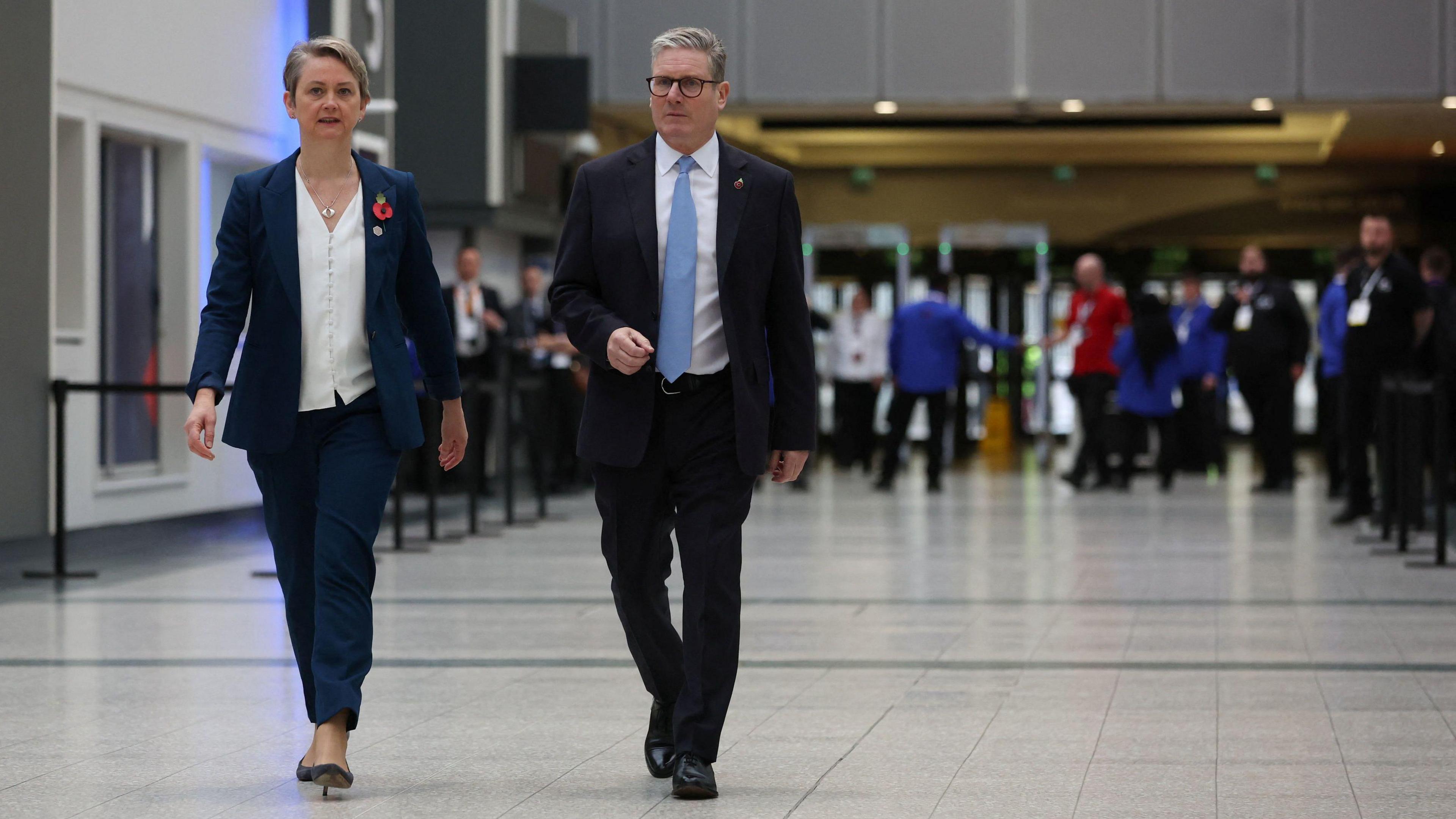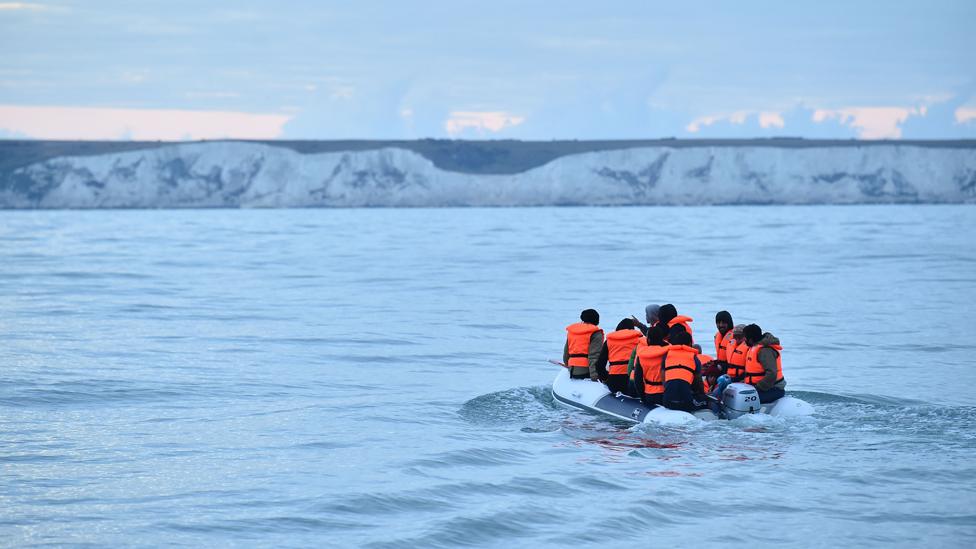'We have to hit small-boat smugglers hard'

Insp De Craemer says more dangerous boats are being used in Channel crossings
- Published
A record number of people have died this year trying to cross the English Channel from France to Kent in small boats.
But all the pieces for these tragic journeys begin to come together a long way away from the French coast.
BBC South East has visited neighbouring Belgium to find out how the authorities there are trying to disrupt the supply of boats coming through their country.
"We have to hit them hard," Insp Peter De Craemer, from the Federal Judicial Police in West-Flanders, said.

More than 33,000 people have crossed the English Channel in small boats so far this year
Mr De Craemer says in recent years there has been an increase in the number of small boats and migrants being transported through Belgium to northern France.
He said some of the boats were found to be "of bad quality, and not up to maritime standards at all".
He says most of the equipment is made in China and arrives via Turkey. It then heads mainly to Germany, from where it is transferred to Holland and Belgium, and then on to the French coast.
"Now we see also the use of inner tubes instead of life jackets, so it's really putting lives in danger.
"We have to hit them hard and make sure nowhere is safe."
This week Germany said it would tighten its law to make it easier to prosecute those helping to smuggle migrants to the UK, as part of a new plan agreed between the two countries.
On Monday ministers and police from the UK, France, Belgium, Germany and the Netherlands met to discuss irregular migration.
The Calais Group, external set out its priorities, including strengthening law enforcement co-operation through Europol, and tackling the use of social media by organised crime groups.

Prosecutor Ann Lukowiak says Belgium has been a hub for migrant smuggling for years
Belgium, because of its location in Europe, has always been a smuggling hub, according to federal magistrate, Ann Lukowiak.
"Organised crime groups have logistical cells here, sometimes drivers have resting places in Belgium, before the boat is handed over," she said.
"We see that migrants are collected here before they go to the boats or the lorries.
"Sometimes we have sufficient elements to identify an organised crime group," she said.
"International cooperation is necessary because not all parts of that crime group are in Belgium.
"We are trying to do work with source countries like Iraq and Turkey."

Christian De Ridder says his officers patrol coastal resorts including De Panne for smugglers
Police on the Belgian coast say there has only been a handful of small boat launches from their coastline since 2020, but they regularly patrol near the French border.
Christian De Ridder, Deputy Chief of Police at the Westkust Police, said: "All of our teams are aware of the problem and have an eye open for it.
"We get intel from the French and British police."
Physical barriers
The Home Office has provided its Belgian counterparts with additional resources to boost security.
"We have special night goggles to use on the beaches, extra cameras, and extra drones with thermal cameras so that we can see in the dark on the beaches and the dunes," Mr De Ridder said.
But he admits that, despite the proximity to the French border, the longer sea crossing from his country may deter some smugglers.
Mr De Ridder said the authorities have also made it harder to access the beaches; "We put in physical barriers, big concrete blocks so they can't drive onto the beach like they did in the past with a trailer and a boat on it."
Migrants seen breaking into lorry park (This video has no sound)
The Belgian authorities say some migrants have switched back to attempting to stow away on lorries bound for the Channel ports, particularly during bad weather.
Earlier this year barbed wire and new scanners were installed to prevent incursions into vehicles at a fuel depot in Veurne.
Mathieu Vander Paelt, director of Romac Fuels and Mattheeuws Eric Transport, says the problem has been solved at his site after extra security was installed.
"We have new cameras and I am looking at artificial intelligence, and if something is happening we get an alarm.
"We also have scanners and private security at night. We think they are now going somewhere else," he said.
"We see more and more often that the problem is going further away from the borders."

Carl Decaluwé, governor of West-Flanders, says his authorities prevent migrant camps being set up
The number of migrants in the coastal areas of Belgium peaked in 2020, according to the governor of the Province of West-Flanders, Carl Decaluwé.
Four years ago, he said, between 5,000 and 6,000 people in the area were trying to climb into truck stops and the port of Zeebrugge.
But, he said, they have been working with the police and the UK Border Force to significantly reduce the number of incursions.
However, Mr Decaluwé said, motorway parking has since been targeted by smugglers, and he says he would like to see more scanners installed.
He also told the BBC that one of his aims was to prevent migrant camps being established in his region.
"We don't want to have tent camps in our province.
"I have seen what that could be in the north of France, starting with 100-200 people, and you do nothing and after some months you have a tent camp of 2,000-3,000 people and then you can't manage it," Mr Decaluwé said.
"The smugglers are always looking for another weak point."
The UK government said it had provided £1.3 million to Belgian law enforcement to prevent and deter launches from the Belgian coastline.
Officials say they are working closely with Belgium to disrupting small boat equipment flows and preventing launches from Belgium.
Follow BBC Kent on Facebook, external, on X, external, and on Instagram, external. Send your story ideas to southeasttoday@bbc.co.uk, external or WhatsApp us on 08081 002250.
- Published10 December 2024

- Published2 December 2024

